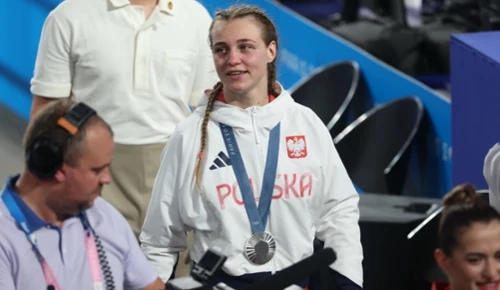“Social Media Erupts as Adrian Meronk’s Comments on PGA Tour and Life in America Divide Golf Fans”
“Social Media Erupts as Adrian Meronk’s Comments on PGA Tour and Life in America Divide Golf Fans”
In the ever-evolving world of professional golf, where the lines between the PGA Tour and LIV Golf are still marked by rivalry, Adrian Meronk has once again become the focus of intense debate. Known for his meteoric rise and unexpected moves, Meronk’s recent comments on the PGA Tour and his decision to join LIV Golf have set off a social media storm, exposing ongoing tensions in the golf world. Despite efforts by the PGA Tour and the Public Investment Fund (PIF) to negotiate and create stability between the rival tours, Meronk’s candid comments have reignited controversy. His words touch a nerve with fans and fellow golfers alike, as they struggle to comprehend the complex motivations that led the 31-year-old Polish golfer to trade the PGA Tour dream for what he considers a better life with LIV.
Meronk has always been a bit of a wild card. Late last year, he announced with considerable fanfare that he had secured his PGA Tour card, surprising some who had speculated he might head to LIV instead. Just a month later, however, Meronk pulled out of the Farmers Insurance Open just before it began, citing an illness. Within weeks, the whispers about his possible defection to LIV Golf grew louder until they were confirmed. By the end of the year, Meronk had played in nearly every LIV event, signing on as a member of the Cleeks and trading in the American tour’s rigorous schedule for LIV’s alternative model.
What surprised many fans was not just the move itself but Meronk’s explanation for it. The Polish pro revealed that his decision was heavily influenced by being snubbed for the 2023 Ryder Cup, a blow that, according to him, tipped the scales in favor of LIV. In an interview, Meronk admitted, “I would probably not have come to LIV if I had played in the Ryder Cup,” pointing out that he believed he had earned a place on Luke Donald’s European team for the event in Italy. Being left off the team, he explained, “definitely made my choice easier.”
But the latest chapter in Meronk’s journey has ignited a new wave of criticism. Recently, in an interview with Gulf News, he reflected on his decision to join LIV Golf, touching upon why he felt the PGA Tour wasn’t the right fit for him. According to Meronk, the thought of committing to a life in America left him feeling apprehensive, as he believed it would make him “lonely and miserable.”
“If I’d played in America, I would have had to base myself there and I would have been so lonely and so miserable, I think,” he shared, explaining that he had made his home in Dubai—a place he genuinely loves. By joining LIV Golf, he says he could stay rooted in Dubai and enjoy a less demanding schedule, unlike the 27-tournament grind he experienced the year before. “I think it was a great decision for me,” he added. “It’s given me so much life and enjoyment. It’s like a rat race on the PGA Tour – everybody is looking out for themselves, and nobody talks to you.”
These comments, particularly his assertion that the PGA Tour was “like a rat race” where “everybody is looking out for themselves,” have quickly become the subject of heated discussion on social media. The Twitter/X account NUCLRGOLF posted the quotes, and from that moment, fans and analysts have jumped in with opinions on both sides. Many users criticized Meronk, painting his words as an indictment of his ability to adapt to the American golf circuit. Some felt he was taking for granted an opportunity that countless golfers would embrace without hesitation, while others saw his remarks as out-of-touch or insensitive.
One vocal user remarked, “If playing on the PGA Tour makes you feel lonely, maybe it’s not the Tour. A lot of players manage just fine and even thrive there.” Another comment struck a similar chord: “So he joined LIV to avoid feeling lonely? Isn’t pro golf a solitary sport? Seems like an excuse.”
Some even suggested that Meronk’s words were a weak attempt to rationalize his decision to join LIV Golf, now that he has faced backlash for turning away from the PGA Tour. “Funny how Meronk only says this after he joins LIV,” one person tweeted. “Just say you want the money, and move on.”
However, Meronk’s remarks weren’t without supporters. A segment of fans agreed with his perspective, particularly those sympathetic to the more demanding aspects of the PGA Tour lifestyle. A fan tweeted, “Meronk has a point—life on the road in America isn’t for everyone. Dubai is a fantastic base for a global pro.” Others pointed out the toll that the PGA Tour’s schedule can take on players’ well-being.
LIV fans also found Meronk’s statements validating, as they pointed to what they consider one of LIV Golf’s core strengths: the flexibility and appeal of its schedule. Supporters highlighted how LIV’s fewer tournaments and more international locations offer a lifestyle that, for some players, might feel less isolating and more fulfilling. “LIV gives players choices the PGA doesn’t. Why hate on Meronk for wanting a better quality of life?” wrote one supporter.
Meronk’s case is further complicated by his background as an international player. For European golfers, relocating to the United States full-time can be daunting, and the experience often comes with a sense of dislocation. But others, like Jon Rahm and Rory McIlroy, have managed to bridge this gap by finding ways to adapt to the PGA Tour lifestyle while maintaining a connection to their European roots. Critics of Meronk’s comments point to these players as examples of golfers who have managed to make the best of both worlds without publicly lamenting their situation.
Meronk’s choice to base himself in Dubai rather than the United States also taps into a larger conversation about what the future of professional golf might look like if LIV Golf continues to attract players with the promise of a more balanced schedule. For LIV, the appeal lies in offering a counterpoint to the PGA’s rigorous structure, one that permits players to pursue a lifestyle where they’re not confined to one region. But for Meronk, this choice has clearly come at the price of fan support.
The commentary surrounding Meronk’s remarks shows how deeply divided golf’s audience remains on the LIV-PGA debate. As more players weigh their options, Meronk’s words underscore the complexity behind these decisions and how, for some, life on the PGA Tour isn’t the fairy-tale journey it might seem. Whether fans agree or not, his honesty opens up a dialogue on the mental and emotional toll that life on the road can have on players, particularly those far from home.
Whether Meronk will address the social media backlash remains to be seen, but it’s clear that his comments have struck a chord. For now, he seems content with his choice, continuing his career with LIV while leaving behind the pressures—and, as he sees it, the isolation—of life on the PGA Tour. Only time will tell if his words will spark deeper discussions on how professional golf can adapt to better support its players or simply serve as yet another divisive moment in the ongoing saga between LIV and the PGA.






